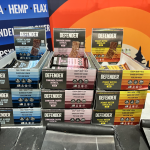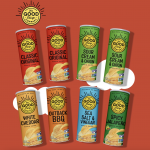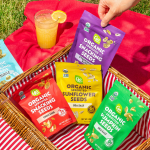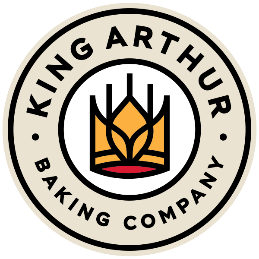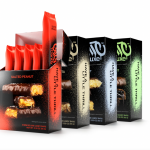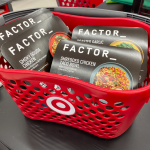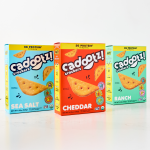Post Launches First Brand from New Incubator, Forms R&D Partnership With Anheuser-Busch
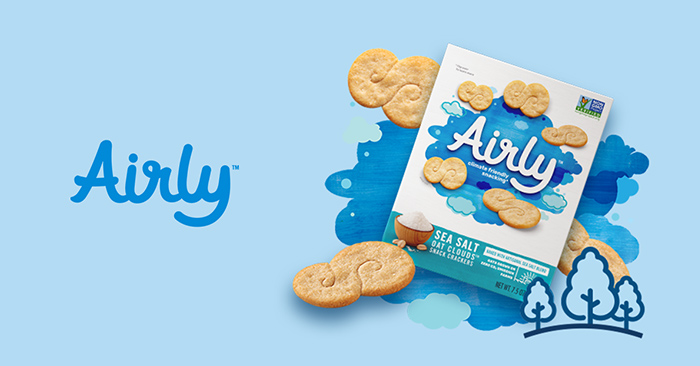
Call it co-incubation. A Post Holdings product incubator is betting on crackers made with environmentally friendly oats as a core ingredient — and it’s brought in another big strategic, Anheuser-Busch, to chip in.
Airly crackers debuted this month as the first brand out of the Bright Future Foods operation launched last year, and it’s already looking ahead to new climate-friendly innovations through a new R&D partnership with A-B’s EverGrain.
Airly offers a line of Oat Clouds, crackers made with carbon negative oats available in Cheddar, Sea Salt, Chocolate and Salted Caramel flavors. The brand was soft launched online earlier this month, selling the crackers in 3-packs of 7.5 oz. boxes for $14.97, with an official launch set for May 17.
Bright Future Foods was established in early 2020 as a wholly owned subsidiary of Post Holdings to “shake up the food industry with visionary innovation and scientific solutions,” according to a Post spokesperson. The incubator team is made up of “cross-functional” CPG veterans drawn largely from Post and other large CPG firms, Airly co-founder Jen McKnight said. McKnight most recently served as VP of Disruptive Growth at Post Holdings, while Bright Future Foods CEO Mark Izzo was SVP and Chief Disruption Officer at Post.
With a broad purview from Post, the team decided to zero in on sustainability, McKnight said, finding agriculture and the concept of farmers “monetizing their own carbon capture” in crops like oats to be particularly interesting. The focus? “Climate Positive Oats,” so called because they are grown using practices that remove carbon from the air and trap it in the soil. To ensure they could produce the oats at scale, the team partnered with farmers to track the crop’s first growing cycle using carbon farming practices like no-till farming and planting cover crops. They then set out to use the oats in crackers, a category with significant household penetration yet relatively small ingredient decks — and in turn a smaller carbon footprint — McKnight said. Post supported the idea, she added.
“Recognizing the potential of Airly’s mission to help reverse climate change through food, Post is backing Airly as the brand looks to disrupt the marketplace by fundamentally impacting the way we snack – from seed to shelf,” the Post spokesperson said. “We are thrilled to support this initiative from a business perspective and look forward to a bright future with Bright Future Foods and Airly.”
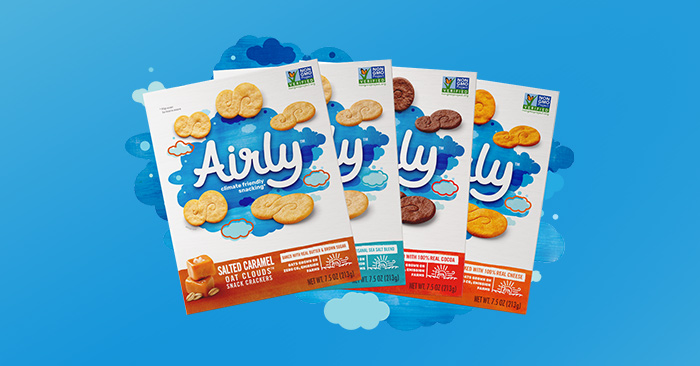
Establishing a negative carbon footprint had its challenges, including creating a farm-level life cycle assessment of its supply chain and finding ways to offset the carbon footprint of its production process through carbon credits. While McKnight couldn’t share specifics regarding Airly’s supply chain partners, she said the brand has “the benefit of the larger Post organization” lending their expertise in finding “the strongest partners out there.”
These partners include fellow St. Louis-based giant Anheuser-Busch, whose upcycled ingredient company EverGrain will be an R&D partner for future products. The partnership is still in early days, McKnight said, but new products will use both EverGrain’s barley protein and fiber produced from upcycled spent grain as well as Airly’s oats. The partnership comes less than a month after A-B announced the construction of a $100 million North American headquarters for EverGrain.
“I think we have very complementary strengths, as we look at their plant-based protein and fibers along with our climate positive oats,” she said. “So I think we’re very much aligned on the impact and why we do what we do and how we use food for the broader good.”
With Oat Clouds and its future product launches, McKnight said the brand aims to reach a wide swath of “climate curious consumers.”
“There are quite a few [consumers] out there who really want to be able to make a difference and be able to incorporate that easily into their lifestyle,” she said. “Because as much as I respect people that are 100% zero waste movement, and some of those things are really important choices, not everybody is willing to go there.”
The Airly team plans to spend the year simply getting the word out to consumers and finding the best ways to communicate the brand’s climate impact, McKnight said. The company hopes to do this first by building brand awareness online before moving into retail, at which time McKnight said they hope to lower the price per box to $2.99 to $3.69. In communicating with consumers, the brand faces a challenge many sustainable brands must reckon with — toeing the line between transparency and information overload. Airly thinks it has found a palatable and whimsical way to contextualize how purchasing a box of crackers can actually benefit the environment, sharing on its website that one box of Sea Salt Airly Oat Clouds removes 19 grams of carbon dioxide from the air, creating the equivalent of 2,700 beach balls of fresh air.
In recent months, Post Holdings has made several moves to support new innovation, including the formation of a special purpose acquisition company (SPAC) and investments in better-for-you snack brand PeaTos and plant-based meat maker Hungry Planet. For Bright Future Foods, McKnight said, “nothing’s off the table” — whether that be internal innovation or incubating startups — due to the “broad license” Post Holdings gave Bright Future Foods.
“Our team really is driven by this idea of how you use food and beverage for the better for the greater good,” McKnight said. “So I think you’ll continue to see us focus our innovations in places where we really can do more than just deliver tasty food, but also deliver better benefits on top of that.”
